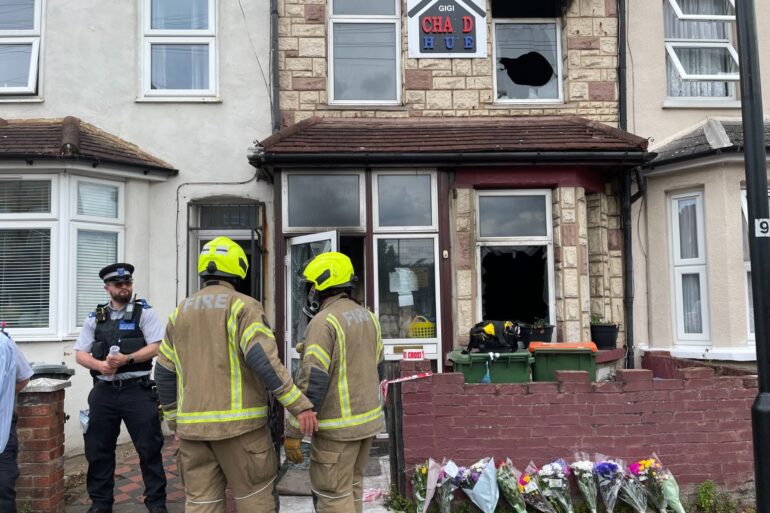-
 play_arrow
play_arrow
KL1 RADIO KL1 Radio Local Radio for West Norfolk
-
 play_arrow
play_arrow
KL DISCO KL Disco Playing Disco Music from the 70's onwards.24/7
-
 play_arrow
play_arrow
KL COUNTRY KL COUNTRY Playing New and Classic Country Music 24/7
-
 play_arrow
play_arrow
KL ROX KL ROX The best of New and Classic Rock.24/7
-
 play_arrow
play_arrow
KL SUMMER Summer Vibes 24/7 from KL1 Radio across West Norfolk
-
 play_arrow
play_arrow
KL CHILL Just Chill!
-
 play_arrow
play_arrow
KL POP The Best POP Hits all day Long!
-
 play_arrow
play_arrow
KL XTRA KL XTRA, The PopUp Station from KL1
music_note
Hamas hostage families call for US-backed Gaza ceasefire proposal to be agreed


President Biden outlined a three-phase deal on Friday proposed by Israel to Hamas
Families of Israeli hostages held by Hamas have called for all parties to immediately accept a proposal detailed by US President Joe Biden.
The deal would end the nearly eight-month-long war and bring their relatives home, but Israel’s government said conditions for a ceasefire still must be met.
Mr Biden outlined a three-phase deal on Friday proposed by Israel to Hamas, saying the militant group is “no longer capable” of carrying out another large-scale attack on Israel. He urged the Israelis and Hamas to come to an agreement to release some 100 remaining hostages, along with the bodies of around 30 more, for an extended ceasefire.
Ceasefire talks ground to a halt last month after a major push by the US and other mediators to secure a deal in hopes of averting a full Israeli invasion of Gaza’s southern city of Rafah. Israel says the Rafah operation is vital to uprooting Hamas fighters responsible for the October 7 attack on southern Israel that triggered the war.
Israel on Friday confirmed its troops were operating in central parts of the city. The ground assault has led to an exodus of around one million Palestinians out of the city and has thrown UN humanitarian operations based in the area into turmoil.
Following Mr Biden’s speech, hostage families said on Saturday that time was running out with the onus on both Israel and Hamas to accept the deal.
“We want to see people coming back from Gaza alive and soon,” Gili Roman told The Associated Press. His sister, Yarden Roman-Gat, was taken hostage and freed during a week-long ceasefire in November, but Yarden’s sister-in-law, Carmel, is still being held.
“This might be the last chance to save lives. Therefore, the current state must be changed and we expect all to adhere to Biden’s call for accepting the deal on the table, immediately. There is no other way towards a better situation for all. Our leadership must not disappoint us. But mostly, all eyes should be on Hamas,” he said.
The proposal came after what hostage families said was an aggressive meeting on Thursday with Israel’s national security adviser, Tzachi Hanegbi, who told them that the government was not ready to sign a deal to bring all of the hostages home and that there was no plan B.
Mr Hanegbi said this week he expects the war to drag on for another seven months, in order to destroy the military and governing capabilities of Hamas and the smaller Islamic Jihad militant group.
Israeli Prime Minister Benjamin Netanyahu has promised a “total victory” that would remove Hamas from power, dismantle its military structure and return the hostages, and on Saturday, the government said its conditions for ending the war had not changed. Putting a permanent ceasefire in place before the conditions are fulfilled is a “non-starter,” it said.
Many hostage families blame the government’s lack of will to secure a deal for the deaths of many of the hostages in captivity.
“We know that the government of Israel has done an awful lot to delay reaching a deal and that has cost the lives of many people who survived in captivity for weeks and weeks and months and months. Our hearts are broken by the amount of people we will receive that are no longer alive,” Sharone Lifschitz told AP. Her mother Yocheved was freed in the November ceasefire, and her father Oded is still in captivity.
The first phase of the deal announced by Mr Biden would last for six weeks and include a “full and complete ceasefire,” a withdrawal of Israeli forces from all densely populated areas of Gaza and the release of a number of hostages, including women, the elderly and the wounded, in exchange for the release of hundreds of Palestinian prisoners.
The second phase would include the release of all remaining living hostages, including male soldiers, and Israeli forces would withdraw from Gaza. The third phase calls for the start of a major reconstruction of Gaza, which faces decades of rebuilding from devastation caused by the war.
Mr Biden acknowledged that keeping the Israeli proposal on track would be difficult, saying there were a number of “details to negotiate” to move from the first phase to the second. The proposal says that if the negotiations take longer than six weeks for phase one, the ceasefire will still continue as long as there are negotiations.
Mr Biden said that if Hamas fails to fulfil its commitment under the deal, Israel can resume military operations.
Published: by Radio NewsHub

Similar posts
Upcoming shows

Weekend Back Trax
6:00 am - 8:00 am

Kelvin Scott – Weekend Breakfast
8:00 am - 11:00 am

Vicky Green – Classic Hit Lunchtime
11:00 am - 1:00 pm

Darren Furzey – Classic Hit Weekend
1:00 pm - 3:00 pm

Lee Vincent – Classic Hit Saturday
3:00 pm - 6:00 pm
-

Paris Olympics off to a sodden start with a rain-drenched opening ceremony

Three children who died in house fire are ‘missed beyond measure’, parents say

John Hunt says messages of support ‘like a hug’ following family crossbow deaths

Police officer under criminal investigation for assault after airport video

Hunstanton Fossil Hunting Trip – 18th August 2024
Message Us Now!
Copyright The Mediasite UK - 2023.



